-
Update Required To play the media you will need to either update your browser to a recent version or update your Flash plugin.
- Listen via a podcast [Help]
- Download as AAC or MP3 [Help]
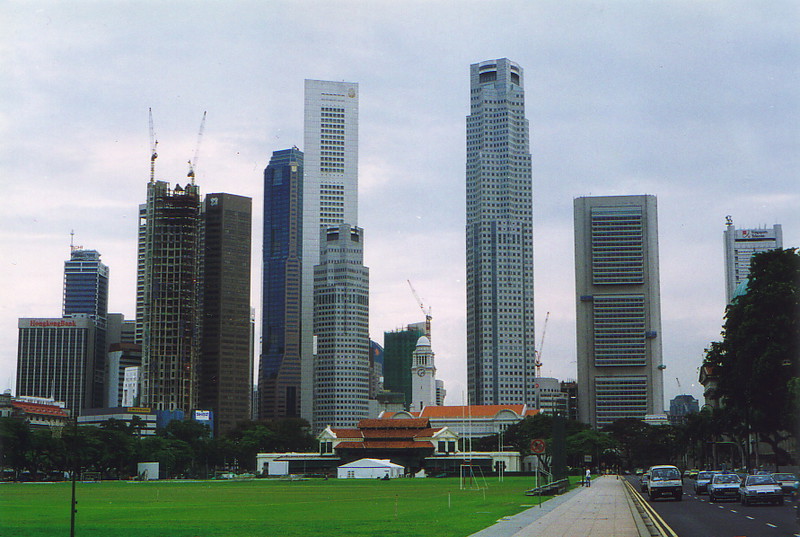
What seems like a long time ago, my sister visited Singapore. I remember thinking how brave this was, and my mind conjured up images of sparkling skyscrapers catching the equatorial sun, Chinese lanterns hanging in the streets, and junks lapping in the harbour. I imagined Singapore to be like Hong Kong, with its distinctive smells, immense crowds and tiny people... and I was almost completely wrong.
Singapore is just another city. It has neither the insane appeal of Hong Kong or, from what I gather, Bangkok; it's much more a western city than an Asian1 one, and feels no different from big Australian cities. I would say that it's no different from most European and American cities, but Singapore has almost no historical feeling to it, as most of the old buildings have long been razed to the ground to make way for skyscrapers, and even those still standing are pretty modern, in the great scheme of things.
So is Singapore a city with no soul, as its critics have been heard to say? That's not so easy to answer; arriving from Indonesia, Singapore's soul reached out and mesmerized me, right from my arrival at the sprawling metropolis of Changi Airport. As the taxi sped through sparkling lights towards the skyline of glowing skyscrapers and huge neon signs, the taxi driver told me about his workaholic brother who didn't take a holiday for three years, took his accrued time off in one go, and after a week was back at the office, working during his holiday because he didn't have a life outside of the office. This was more than a little hard to imagine after the astoundingly lackadaisical world of Indonesia.
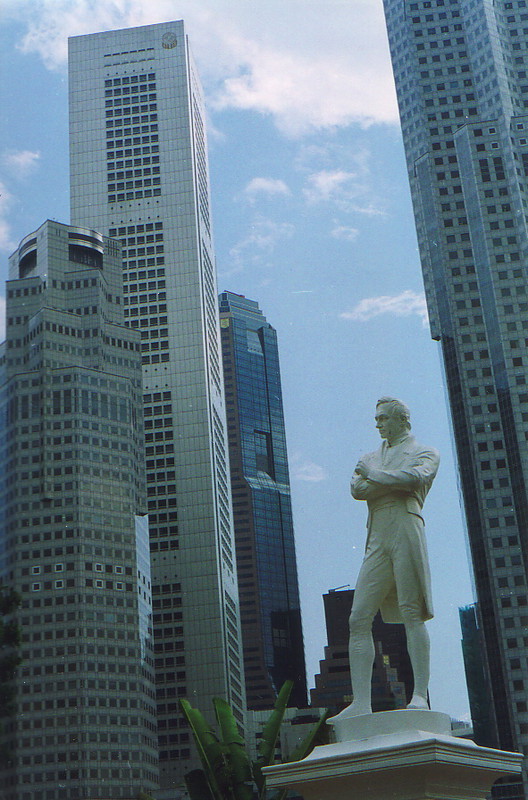
I was staying with a friend – Philip, an investment banker, a showman, an excellent host, a city socialite, a work-hard-play-hard go-getter and an entertaining conversationalist rolled into one – and because he was only going to be there for one night before shooting off to Bangkok, we hit the town. It almost proved too much. Real beer, yuppie pubs, a late night and high-powered people with brains... the tentacles of western civilisation reached out for me with its promises of a better life and solutions for all. I had visions of what this short but sweet visit to Singapore might offer me: hot showers, a kitchen in which I could cook, supermarkets2, phones that didn't crackle and hiss, pizzas and burgers... my pupils were probably dilated with the opiate of Singapore.
The effect of seductive Singapore lasted well into the next day, despite my waking up with Indonesia's parting gift; yes, you guessed it, I left Bali with a few extra friends living in my stomach, and it took about five days to shift the bastards and get my temperature down to normal. I simply wandered around, shamelessly gawping at the scenery.
And it rained!3 I'd forgotten what it was like to be soaked by nature; the last rain I remembered had been in the Bada Valley towards the end of the trek with Peter. It was simply wonderful, cleaning the air, removing the humidity, reducing the famed haze to almost nothing. I was truly in the Promised Land, and then I realised; for the first time in 25 months I was back in the northern hemisphere, my home. Perhaps Singapore was putting on a special English weather pattern to welcome me back into the bosom of the north, where a northerly wind is cold, where the sun is in the south, and where the constellations are those of the ancient civilisations4.
Exploring Singapore
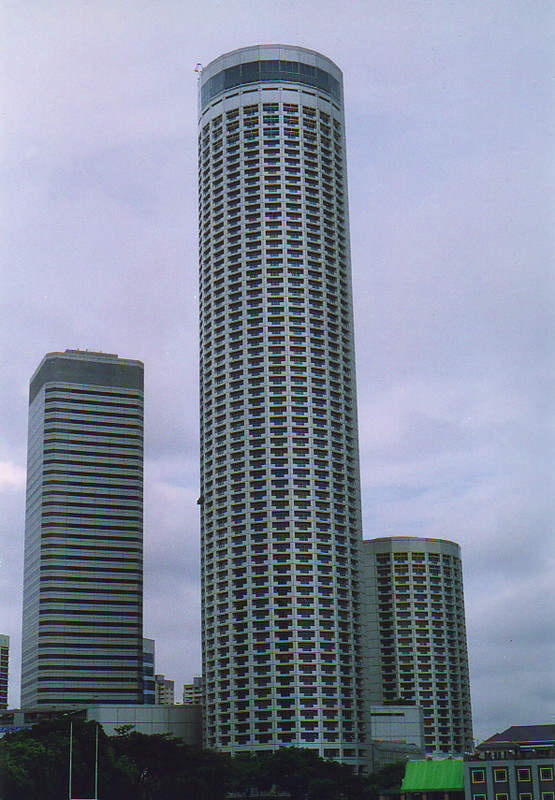
Singapore has a smell, too; it smells of perfume. If you're in one of the millions of immaculately manicured parks dotted between the high-rises, the smell of flowers permeates the air; maybe the gardeners, of which there are many (most of Indian descent), spray the flowers with scent, but I've never experienced a city's gardens in such an olfactory way before. And if you're walking down the street, well away from the parks, the smell is of Opium, Escape, Kouros, Obsession... it's like a nasal trip through the pages of Vogue. The result is a city that smells divine, and reeks of expense.
For Singapore is a monument to money and capitalism. Every sign and advert is in the language of business, English, and everyone speaks English too (or, at the very least, the local version of English, known as Singlish, in which 'chequebook' becomes 'che-boo', 'last week' becomes 'las-wee' and so on). The money is printed in English. The street names are in English. I presume the meetings held on the executive floors of those sparklingly phallic tower blocks are in English. There are half a million ex-pats living in Singapore – an astounding number when you consider the entire population of Singapore is a little over three million – and the whole place reflects this. If I had visited Singapore straight from England without first having explored the multiculturalism of Australia, the European-Polynesian confluence of the Tuamotus, or the insanity of Indonesia, I would no doubt have been bowled over by the Asian character of Singapore; but having come straight from the jugular, so to speak, Singapore appears to be so different from the rest of its region that it's hard to think of it as Asian. It's Ameropean, Euramerican or some other disgusting nouveau-word; it's not soulless, it's just an amalgam, and as with all amalgams, some things get lost in the mix.
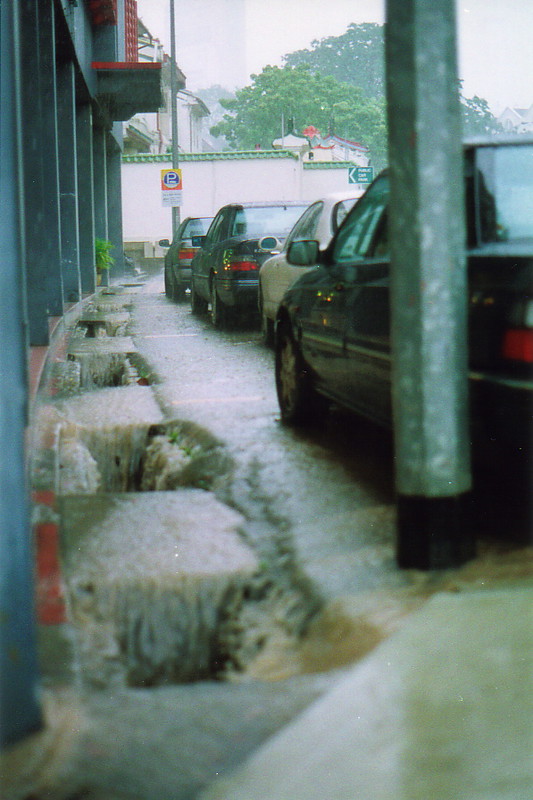
The high standard of Singaporean technology is also to blame for hiding the city's character behind closed doors. It's those closed doors that drive home the difference between the plastic world of Singapore's offices and the harsh reality of equatorial life; if you walk past an office block just as the next stock market guru is bursting through the automatic doors, the rush of chilled air that blasts out is intense. Air conditioning is a way of life in Singapore – not a bad thing when the average temperature at this time of year is 35 degrees with 90 per cent humidity – but being blasted by office blocks is a novel experience. You've got to be careful if it happens when there's a crowd about; I swear that if I'd bumped into someone as they strolled out of an office I'd have shattered them into lots of tiny pieces. It really is that cold.
And the crowds are guaranteed at lunchtime. Standing outside an office block at 12.30pm is fatal; millions of clean-suited and perfumed people suddenly appear, whisked by on a breath of frozen oxygen, all heading for the local food market, clogging up the pedestrian crossings and pavements in a crowd scene that makes the London Marathon look like a few old ladies out for an evening stroll. It only lasts for a couple of seconds, but it's more destructive than a plague of locusts.
Law and Order
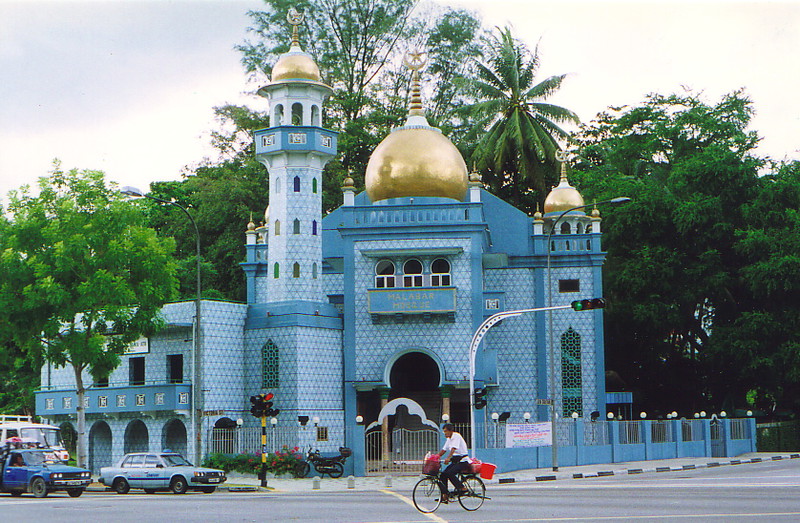
Of course, if this were London or New York, the crowd would disperse into the jammed traffic, spreading out like ink in water. But Singapore is the law and order capital of the world, where jaywalking is just one of millions of offences that will get you a hefty fine; being arrested for jaywalking in the West is simply unlucky, but in Singapore there are even signs everywhere, warning you not to cross the road outside of the glare of the little green man. Other heinous crimes include importing chewing gum (which is illegal in Singapore, though individual possession isn't an offence), not flushing public toilets, smoking just about anywhere and criticising the government. The result is a wonderfully clean, fresh and clinical city, populated by people who are treated like children.
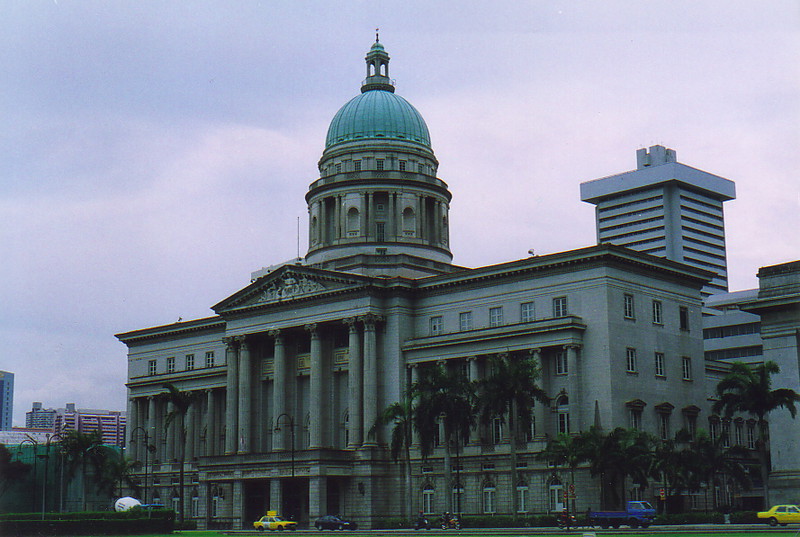
You know that feeling in the pit of the stomach when you're at a wedding and the priest says, 'Speak now, or forever hold your peace,' and you think, 'I wonder what would happen if I stood up and said something?' Or when you're in a meeting with your boss, and you think to yourself, 'Wouldn't it be great if I stood up and told him exactly what we all think of him?' Well, I kept getting the same feeling when walking round Singapore, except my thoughts were more along the lines of 'I wonder what would happen if I crossed the street right here?' or 'I wonder what they'd do if I didn't flush'. It quite unnerved me to be in a city where passing wind in a public place probably contravenes the Health Regulation Code of 1987, Appendix C Subsection III. No wonder everyone suffers from executive stress.
It is a peaceful and relaxing place, though, despite the draconian government and its desire to make sure everyone is safe and happy – by decree. I was able to realise my dream of the last two months, to sit in parks undisturbed, able to type up my travelogue, read a book or just snooze. Indeed, in the whole time I was in Singapore I was approached by just one chatty local, who turned out to be a well-educated, well-travelled and interesting man, speaking fluent English, French and Mandarin; our conversation was only terminated because the heavens opened. What a difference from Indonesia!
Love or Hate?
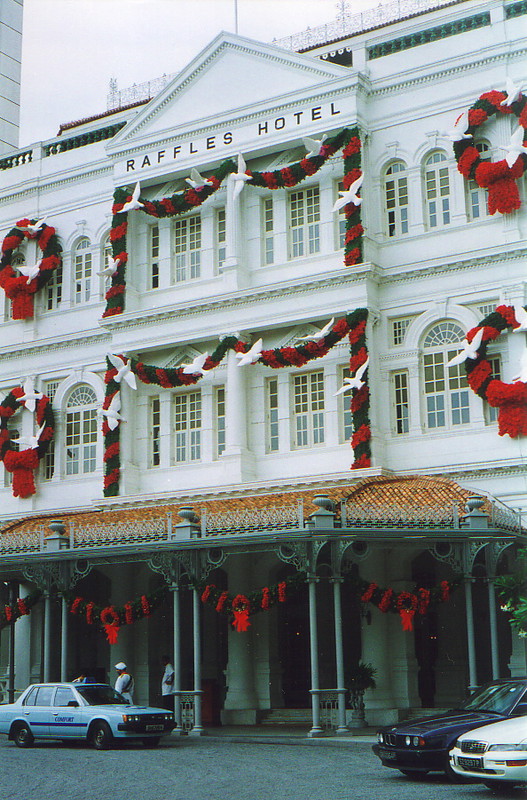
But is this place a Utopian paradise or an Orwellian nightmare? Damned if I know, but I do know that in this modern-as-tomorrow city, not everything's as ultra-futuristic as it might first appear. For example, at the supermarket you still have to weigh your fruit and vegetables at a separate counter, as the checkouts don't have scales; I thought this had gone out with Fred Flintstone. And neither the supermarket nor the post office would accept credit cards, unlike almost everywhere else in the city that leapt on plastic like a hungry dog does a bone; I had to cash an extra travellers cheque to mail off my photographs.
And then there are the stories of the government that go beyond belief. The birth control programme introduced in the early 1970s was so effective that it had to be reversed, and now there are tax incentives for families to have three children, and adverts everywhere about how wonderful families are; it seems too many Singaporeans are caught up in office life to appreciate that there's a world out there. Then there was the government's statement that they are actively seeking more people from abroad to reside in Singapore, because the current younger generation is too damn lazy to push Singapore into the next century; they've grown up with everything, and have no reason to struggle like their parents and grandparents had to.
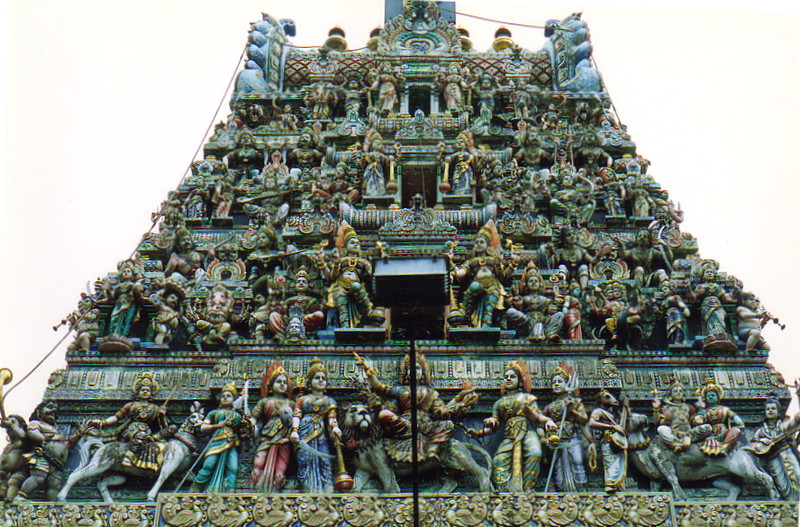
The talented and driven members of the younger generation aren't that interested in staying in Singapore either, an understandable attitude, and they have the skills to bugger off, so Singapore needs to bring in foreigners to help it continue to be a success. And this true story has to be the best summary of Singapore's attitude towards life; when asked to comment on what he thought of the fact that some foreigners found Singapore dull, the Minister for Finance and Foreign Affairs, George Yeo, said, 'We have to pursue this subject of fun very seriously if we want to stay competitive in the 21st century'. Doh!
Still, I found Singapore to be an addictive drug, in the same way that an easy life in London was addictive until I left. Cable television, a fridge, air conditioning, swimming pool, nearby shopping malls (millions of them), peaceful parks, no language barrier... it's easy to understand why it was hard to break away in the end. Indeed, the company was excellent, and although I'd planned to spend only a few days hanging round the parks and malls, I ended up staying for 12 days, 12 days of sheer bliss.
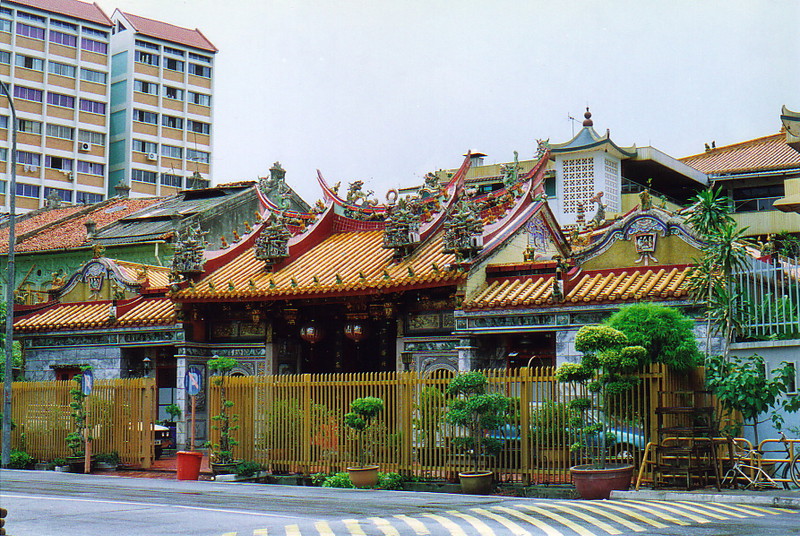
For example, one Friday night I hit the town with Rebecca (Philip's flatmate) and her boyfriend Daniel; Rebecca, a 6 ft-something stunner from Australia, had proved to be wonderful company through the week (on the few occasions that she wasn't staying round Daniel's), and Daniel, the proprietor of a local bar/restaurant called Brewerkz, was a scholar and a gentleman. I'd forgotten how mesmeric intellectual conversation could be, and Friday night – supposedly a quick meal and maybe a beer, seeing as Rebecca was suffering from exhaustion5 – turned into a huge meal, copious beers and back-home-somewhere-around-3.30am night. I enjoyed every lip-smacking second of it, not least because Brewerkz makes its own beer on the premises, and it's quite superb.
Saturday night saw Philip and I hit the town for a curry and a couple of beers, in a little restaurant situated right on the Singapore River in the area known as Boat Quay. A hundred yards away are the skyscrapers of the Central Business District, over the river is the first landing point of Sir Stamford Raffles – the British Governor who is regarded as the father of modern Singapore – and milling round the quay is the most wonderful collection of people you're ever likely to see: ex-pats, tourists and locals of all sorts of nationalities; suits, shorts and T-shirts; young people, old people... as an exercise in multiculturalism, Singapore excels.
1 You'll often see the countries in this part of the world referred to as ASEAN, rather than Asian. ASEAN stands for the Association of Southeast Asian Nations, namely Singapore, Brunei, Indonesia, Thailand, Malaysia and the Philippines, so these are all Asean countries. Asian is too broad an area to be useful, so you'll often see this acronym used to refer to the Southeast Asian area.
2 Yes, Singapore has plenty of supermarkets whose aisles stretch so far that when you look down them, you can see the curvature of the earth. I feel no shame when I tell you I happily spent hours staring at things like loaves of bread, packaged meat, frozen peas and chips, milk cartons, apples and oranges... and one joyous night I was shopping in the Cold Storage supermarket, and I spotted something on special offer: Heinz Baked Beans. That night, I made some toast, heated up the beans, cracked a can of Coke and sat down to the culinary equivalent of sex. As I shovelled the beans in and tomato sauce dribbled down my bristly chin, I realised that I had unwittingly discovered where advertising agencies get all those plonkers who appear on TV commercials, sitting at the breakfast table and eating Kellogg's new Krispy Coco Frosty Bix, faces lighting up the instant the food hits the mouth, regardless of the fact that the brain can't have processed the taste sensation yet; the sort of people who glare wide-eyed into the lens and say things like, 'All this taste... and it's healthy too!' All the agencies do is find people who have been stuck in bloody Indonesia for two months; my face as the beans slid down was a picture, and I could have sworn I kept making those little whooping noises, the ones you make when you finally get to have that piss that's been bursting your bladder for hours.
3 It's the monsoon season now and the rains, which might only last for an hour or so each day, are spectacularly heavy, often accompanied by thunder and lightning. One memorable time I was returning from a sodden wander through Fort Canning park, only to discover that the drainage system simply couldn't cope with the sudden downpour, and muddy water was gushing right down the main street, desperately trying to find a river to flow into. It was quite a sight; the buildings are so modern they've got amazingly efficient water-shedding systems, channelling all the rain that lands on them into specially designed drains that take the water down to street level in super-quick time, making sure that not a drop ends up on a veranda or – heaven forbid – inside any of the condos. Unfortunately some of the condo designers forgot to connect the drains to anything downstairs, and in some areas the water simply pours out onto the pavement; in a storm, that's a hell of a lot of water crashing down onto the pedestrians, who are already pissed off enough by the buses and trucks splashing them from the other side. It's one of the few design faults I found in Singapore, but I doubt anyone else knows about it; they're all probably inside, sitting in moisture-free controlled environments, with virtual fires and computer screens showing sunny beaches. Bastards.
4 Even if the southern hemisphere has far more stars and is a much more impressive sight, there's nothing quite like seeing Orion rising in a cold, clear European night sky. In my very humble opinion, anyway...
5 Singapore is full of stressed executives. Rebecca, in her job for a huge multi-national accountancy firm, had just completed something like thirteen consecutive days at work, during which she'd had to have an operation to remove samples of her stomach lining to discover the cause of her latest acquisition, a stomach ulcer. Philip had just spent nine days in Bangkok and Beijing, staying up until the wee hours to prepare presentations and meetings. Rebecca had to take Friday off work, because she felt absolutely terrible; Philip slept until 3pm on Saturday. It made me appreciate travelling more than usual...